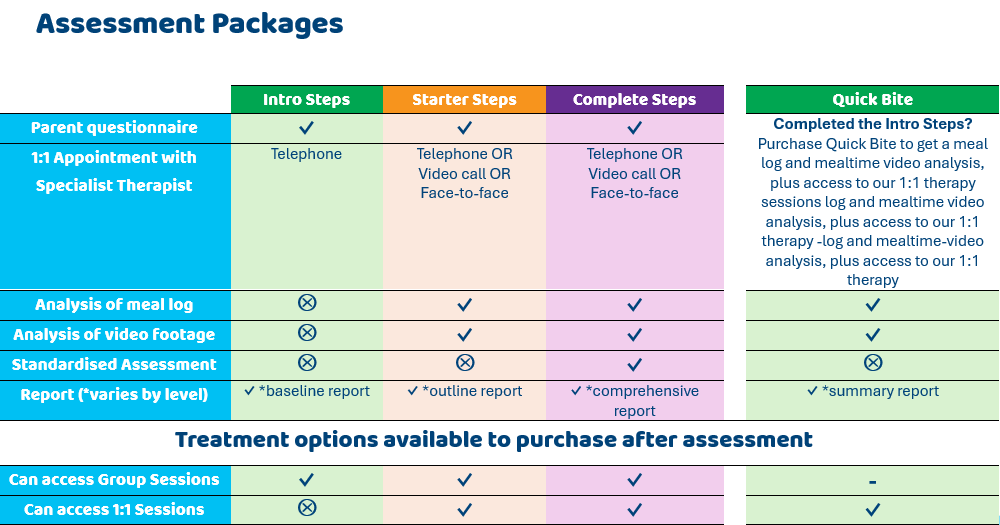Steps to Feeding Success offers specialist private feeding therapy for infants, children and young people who may not be eating a wide enough variety of foods, or who aren't eating in ways typical of their age.
With expert guidance, a child-centred process and practical strategies you can use at home, Steps to Feeding Success helps children build confidence, skills and a more positive relationship with food.
You can book a free 15-minute Discovery Call with one of our specialist therapists to talk through your child’s feeding challenges and find out how Steps to Feeding Success can help.
For our most up to date availability and to book your slot, visit our Eventbrite page.
Want to find out how Steps to Feeding Success private feeding therapy can support your child? You can now book a FREE 15-minute Discovery Call with one of our specialist therapists.
See our current availability and book your call here.
To get in touch with the Steps to Feeding Success Team, please fill in our contact form.
Steps to Feeding Success private therapy is available individually or within small age-appropriate groups. It is for children aged 6 months to 16 years (19 years for young people with special educational needs). Sessions are currently held at Platt Bridge Health Centre near Wigan.
Steps to Feeding Success has been developed by a team of specialist Occupational Therapists to support children and their families struggling with mealtimes. 
Based in Wigan, and within a 45-minute drive from parts of Merseyside, Greater Manchester and Lancashire, we provide both individual and small-group therapy that bridges the gap between what the NHS can currently offer and the support your child might need.
Our approach is family-centred, evidence-based and focused on making food fun while building the skills children need to eat confidently.
We offer a comprehensive package of support that includes:
- Feeding assessments and evaluation to understand your child's feeding challenges including sensory, motor and behavioural factors.
- Therapy Sessions: individual and group feeding therapy to help your child to develop positive enjoyable experiences with food.
- Support and guidance for parents: practical strategies to make mealtimes less stressful and more successful.
Steps to Feeding Success is grounded in the internationally recognised SOS (Sequential Oral Sensory) approach to feeding - a proven method that has helped thousands of families worldwide to overcome picky eating, sensory-based feeding issues and mealtime anxiety.
Assessment process
Our comprehensive feeding assessment helps us understand your child’s unique needs and challenges around mealtimes. We use a structured, evidence-based approach to gather a full picture of their feeding skills, sensory responses, and mealtime experiences.
'Complete Steps', 'Starter Steps', 'Intro Steps' and 'Quick Bite' assessment packages* are available. Dependant on which package is recommended, your child's assessment may include:
- Analysis of a pre-assessment questionnaire completed by parents will help us to understand your child’s feeding history and current challenges.
- Standardised Assessments – We use tools such as the Sensory Profile 2 and Pedi-EAT to evaluate sensory processing and feeding-related behaviours.
- Mealtime Video Analysis – you film a 'typical' mealtime, allowing us to observe their child’s eating habits in a familiar setting.
- Food Diary Review – you record what your child eats over several days, helping us assess their diet variety, intake and mealtime patterns.
Following the assessment, we provide a report summarising our findings and recommendations. This may include tailored strategies, next steps for therapy and practical support to improve mealtimes at home.
Our goal is to provide families with a clear understanding of your child’s feeding difficulties and a pathway to progress.
*See pricing section for full details of assessment packages.
Want to find out more? Get in touch with us using our contact form. 
Therapy process
Steps to Feeding Success therapy is delivered individually or in small age-appropriate groups. The support offered is tailored for different developmental stages:
- Food Foundations – for those in the early stages of food discovery and weaning
- Food Explorers – for those who are ready to explore new foods through play
- Food Scientist – for those who can understand and follow activities helping them explore taste, textures and smells to build confidence and broaden the foods they eat
- Food Investigators – for those ready to take the next steps to explore foods in more depth and expand their diet.
Each session is personalised to your child’s needs, helping them progress at their own pace. We also provide parents with practical strategies to support their child’s feeding development at home.
Want to find out more? Get in touch with us using our contact form.
 Steps to Feeding Success has been operating as a service since 2021. In that time, we have helped many families with feeding challenges, and young people, parents and healthcare professionals have given us positive feedback.
Steps to Feeding Success has been operating as a service since 2021. In that time, we have helped many families with feeding challenges, and young people, parents and healthcare professionals have given us positive feedback.
Parents:
- He thoroughly enjoyed his sessions. Since they ended, he has become more confident and happy. We’ve had glowing reports from all of his peers at school of how much more he has come out of his shell. He is more confident with food and asking more questions and getting more involved.
- I definitely feel like we are making food feel normal around her. Honestly, you have changed our lives. I am so grateful.
- The therapists were amazing and did everything to make this experience the best it could be. I couldn’t thank them enough and would highly recommend this service for parents.
- The staff were so professional and kind. I will definitely be using the tips and skills from the session.
Young person:
- My therapist has been very nice, helpful and supportive. Her sessions have helped me massively and brought me great joy. I am hoping to continue with my food trying and am very happy with the service.
Professional:
- Good feedback from child! Mum was saying how good you’ve been and he’s increasing in weight, eating more and playing with more of his foods!
Pricing Structure
All prices are subject to change
Assessment
Discovery Call – Free
A 15-minute call with one of the clinical specialist Occupational Therapists to understand your current concerns and how Steps to Feeding Success might help.
Complete Steps Assessment - £400
Includes 1:1 video call with parent, mealtime video analysis of child, review of a three-day nutritional food log, standardised assessments and a comprehensive report.
Starter Steps Assessment - £200
Includes 1:1 video call with parent, mealtime video analysis of child, review of a three-day nutritional food log, and an outline report.
Intro Steps Assessment - £130
Includes a 1:1 telephone call with parent, analysis of parent questionnaire and a baseline report.
Quick Bite Assessment - £70
Discounted option available for patients living in the Wigan Borough who have previously accessed NHS feeding therapy.* Includes a summary report of child's mealtime video analysis and review of three-day nutritional food log.
*Within the past three months.

Treatment Session Packages
Following assessment, individual or group treatment sessions are available.
Individual Treatment Sessions
- Single 1:1 treatment session - £125
- Block of three 1-1 treatment sessions - £360
- Block of six 1-1 Treatment Sessions - £690
Please note all treatment sessions should be completed within six months of your previous appointment, including initial assessment.
Group Treatment Sessions 
Block of small age-appropriate group treatment sessions - £400 (£350 for Wigan families who've previously attended NHS group sessions within three months).
- Parent training session completed before your child starts the group sessions
- Five group sessions for your child
- Parent menu resource pack worth £50
Steps to Feeding Success in based in Platt Bridge, near Wigan, close to junctions 23 and 24 of the M6, and to the A58. It is within a 45 minute drive from parts of Merseyside, Greater Manchester, and Lancashire and is easily accessible from the wider North West.
Address:
Platt Bridge Health Centre
Rivington Avenue
Wigan
WN2 5NG
What 3 Words: Vote.Torn.Pump
If you wish to contact the team, please use our contact form.
Alternatively, our phone number and email address are below.
Email: StepsToFeedingSuccess@wwl.nhs.uk
Phone Number: 0300 707 1440
We will respond to your query as soon as possible, but it may take up to 3 working days for a response.
What is a FREE Discovery Call?
A Discovery Call with Steps to Feeding Success is a friendly, structured conversation designed to help us to understand your concerns about your child’s feeding and explore what kind of support would be most helpful. It gives you space to talk through challenges and ask questions, while also outlining how the service works. During the call, you’ll learn about our approach as well as our private package prices so you can make an informed and confident decision about the next steps.
Why do we need to have an initial assessment?
Our feeding assessment helps us to understand the underlying reasons behind your child’s feeding difficulties. Every child is different and challenges for eating can be linked to sensory sensitivities, motor skills, medical history or learned behaviours. Our assessment allows us to:
- Identify what might be making mealtimes difficult for your child.
- Understand their sensory preferences and how they interact with food.
- Assess their oral motor skills and ability to chew, swallow and manage different textures.
- Provide a clear plan with personalised recommendations to support your child’s feeding journey.
By gathering this information, we can create a therapy plan tailored to your child’s needs, helping them develop confidence skills to enjoy a wider range of foods.
How long after my assessment will I receive my report?
Our reports are completed within 2 weeks of the assessment date (subject to receipt of the food diary and mealtime video content from parent/guardian).
What should I tell my child about their upcoming feeding therapy session?
How you explain the sessions will depend on your child’s age and level of understanding. The goal is to keep it positive and reassuring so they feel comfortable and prepared. Here are some simple ways to talk about it:
- For younger children: “We’re going to meet someone who helps children learn about food. They have fun games and activities and you’ll get to explore different foods together.”
- For older children: “We’re going to see someone who helps children and young people with eating. They’ll talk to you about your food likes and dislikes and work on problem solving to make it easier for you to explore new foods.” Let them know they won’t be pressured to eat anything in the session and that the time they spend there is to help them become more comfortable with food.
How long will my child need therapy for?
The length of feeding therapy varies depending on your child’s individual needs, progress and goals. Some children and young people may benefit from a short block of sessions to work on specific challenges, while others may need longer term support to gradually build their confidence and skills with food. Factors that influence the length of therapy include:
- The severity of feeding difficulties (e.g. sensory sensitivities, restricted diet and oral motor challenges).
- Your child’s pace or progress – every child learns at their own speed
- How well strategies can be carried over at home between sessions
We regularly review progress and adjust the therapy plan as needed. Our goals is to provide your child with the tools they need to develop a positive relationship with food at their own pace.
How long will each session last?
Each session is planned to be 1 hour long, consisting of a 45 minute therapy session and a 15 minute period to discuss recommendations for completion prior to the next appointment and parental feedback.
Will parents join the assessment and/or treatment sessions?
Parents are welcome to attend assessment and treatment sessions with the expectation that the Therapist will lead each session and coordinate the process to guide both parent and child to maximise the available time. When providing any feedback at the end, this is usually limited to the last 15 minutes of each session to help to maintain the flow of the planned session content.
Where will my session take place?
Sessions are currently held at Platt Bridge Health Centre, Rivington Avenue, Wigan, WN2 5NG.
What is your cancellation policy?
In the event that you need to cancel a session, it is requested that you provide as much notice as possible and contact us at least 48 hours in advance. This allows us to manage our schedules effectively and, if necessary, accommodate other clients during that time.
In the event of late cancellations (less than 48 hours’ notice) or missed appointments we will be unable to rebook the missed session and no refund will be provided.
What are your opening hours?
Our administration office is open Monday - Friday 9am-5pm. We aim to respond to all queries within 3 working days.



